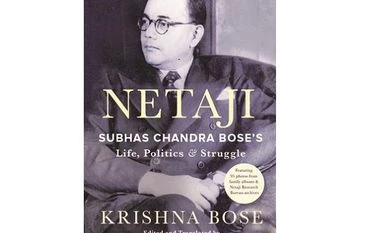Netaji: Subhas Chandra Bose’s Life, Politics & Struggle
Author: Krishna Bose (Ed. And Tr. Sumantra Bose)
Publisher: Pan Macmillan India
Pages: 332
Price: Rs 699
Undergraduate students admitted to Presidency University — the erstwhile Presidency College — in Kolkata are often taken by their seniors to the famous staircase where Subhas Chandra Bose, one of the best-known leaders of India’s freedom movement, allegedly assaulted a British teacher in 1916. The teacher, whose name is not very well known, was accused of hurling racist slurs at his Indian students — an entirely believable accusation in colonial India. After India’s independence in 1947, several biopics of Bose depicted this incident, including, most recently, Bose: Dead/Alive starring Rajkummar Rao in the titular role.
Bose was expelled from Presidency College for his role in the attack on the teacher. The incident, he claimed in his autobiography, launched his political career. However, in 1971, when Bose’s nephew, the paediatrician Sisir Kumar Bose, and his wife Krishna Bose, an academic and later parliamentarian, met Edward Farley Oaten, the teacher whom Bose had allegedly assaulted, at his home in England, he asked them: “Is it true that in India, in some of the films on Subhas, I have been shown as a fierce-looking man rushing towards the students to attack them?” Sisir and Krishna Bose found Oaten to be a fan of Bose, who had even written a sonnet on his former student after the latter’s tragic and mysterious death in 1945:
“Did I once suffer, Subhas, at your hand? Your patriot heart is stilled, I would forget!”
Many such remarkable stories fill the pages of the book under review, which collects several articles written by Krishna Bose. Krishna and her husband, Sisir, established the Netaji Research Bureau (NRB) at the ancestral Bose home in Kolkata’s Elgin Road in 1957. They also travelled around the world, meeting Bose’s associates from Germany, east Europe, Singapore, Japan, and other places. The articles she wrote, mostly in Bengali, have been translated and edited by her son Sumantra Bose, a political scientist who earlier taught at the London School of Economics and currently serves as the director of the NRB.
“Netaji Research Bureau’s success and stature are due above all to the commitment and perseverance of Dr Sisir Bose,” writes Sumantra Bose in the introduction to the current volume. “Yet Sisir Bose did not do it all on his own. He had the quiet and deeply involved support of his spouse. This explains why this volume is so powerfully authoritative.” As Sumantra Bose explains, his mother was particularly interested in Bose’s relations with important women in his life, whether it was his mother Prabhabati Bose or his Austrian wife Emilie Schenkl.
The book also includes a letter that Bose wrote to his brother Sarat Bose in 1943, revealing his marriage to Schenkl and the birth of his daughter Anita. Earlier this month, Anita Bose Pfaff claimed that she wishes to ask India and Japan to conduct a DNA test with Netaji’s ashes at Tokyo’s Renkoji Temple to put to rest speculation about his death.
Netaji’s life — and death — have been the subject of innumerable books, articles, and films, not all of which have been rigorous in their research. In the 1930s, Bose emerged as a challenger to M K Gandhi and Jawaharlal Nehru’s lobby in the Congress, differing with them on what strategy to be used to fight the British. He preferred direct action, as opposed to Gandhi’s non-violent resistance, and when World War II broke out, he decided to support the Axis powers. His escape from house arrest in Calcutta, with Sisir Bose driving him to Gomoh railway station in Jharkhand, and then to Berlin, through Afghanistan and the Soviet Union is the stuff of legends.
His death, allegedly in a plane crash in 1945, has been challenged by many of his supporters and has sparked conspiracy theories ever since. One of these theories revolves around Gumnaami Baba, an ascetic who lived for several years in Uttar Pradesh, and was claimed to be Netaji in hiding. A 2019 Bengali film, directed by Srijit Mukherjee and based on the book Conundrum by journalists Anuj Dhar and Chandrachur Ghose, celebrates this theory. The film went on to win a National Award, though its historicity has been challenged by critics.
One of the most controversial aspects of Netaji’s life was his association with Nazi Germany. Historian Romain Hayes in his book Bose in Nazi Germany writes that Netaji’s most damning indictment was his failure to criticise the Holocaust. Being a member of the Bose family, Krishna Bose could have been forgiven for ignoring this aspect, or maybe even glossing over it. But she casts an uncritical eye even on this aspect of Bose’s career and presents documentary evidence of several instances when the Indian leader criticised the Nazis.
Whatever one might write about Bose, one has to accept that he was a deeply complex personality. Krishna Bose’s research in no way tries to present a simple and laudatory portrait. On the contrary, she dispels the mists of mythology swirling around him to present us with a human, all too human character study and a product of his times. It is an important book, not only for those interested in Netaji but also for those curious about India’s late-colonial history.
Unlock 30+ premium stories daily hand-picked by our editors, across devices on browser and app.
Pick your 5 favourite companies, get a daily email with all news updates on them.
Full access to our intuitive epaper - clip, save, share articles from any device; newspaper archives from 2006.
Preferential invites to Business Standard events.
Curated newsletters on markets, personal finance, policy & politics, start-ups, technology, and more.
)